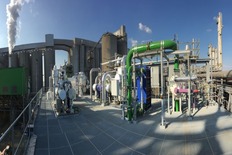- The new CO2 capture line in Ghent increases annual CO2 capture by 60%, totaling 160,000 tons.
- GreenCO2 invested 10 million euros in the second CO2 recovery unit, with a total investment of 25 million euros.
- The captured CO2 is reused in industries like food, beverage, horticulture, water purification, refrigeration, and chemistry.
- The project aims for climate-neutral production by 2030, contributing to the European goal of climate neutrality by 2050.

Investment and Capacity Increase
The new CO2 capture line in Ghent increases annual CO2 capture by 60%, totaling 160,000 tons. This investment allows for the capture of all CO2 released during the biomass fermentation process at Alco Bio Fuel (ABF).
CO2 Reuse Applications
The captured CO2, also known as carbon dioxide or carbonic acid in liquids, is treated and reused in various sectors such as the food and beverage industry, greenhouse horticulture, water purification, refrigeration transport, and chemistry. The solid form of CO2, dry ice, is a well-known cooling and cleaning agent.
Environmental Impact
Capturing and reusing this CO2 of green origin avoids the use of an equivalent amount of fossil-origin CO2, effectively reducing CO2 emissions by 160,000 tons per year. This reduction is comparable to taking 117,000 cars off the road in Belgium.
Financial Details
GreenCO2, a joint venture between Messer Benelux, IJsfabriek Strombeek, and ABF, invested 10 million euros in the second CO2 recovery unit. Combined with a previous investment of 15 million euros in the first capture line, the total investment now amounts to 25 million euros.
Future Goals
In addition to bioethanol and CO2, the processed biomass yields improved proteins for cattle feed and maize oil. This investment represents a significant step towards climate-neutral production, with ABF aiming to achieve climate neutrality for its production sites by 2030, in line with the European goal of climate neutrality by 2050.

